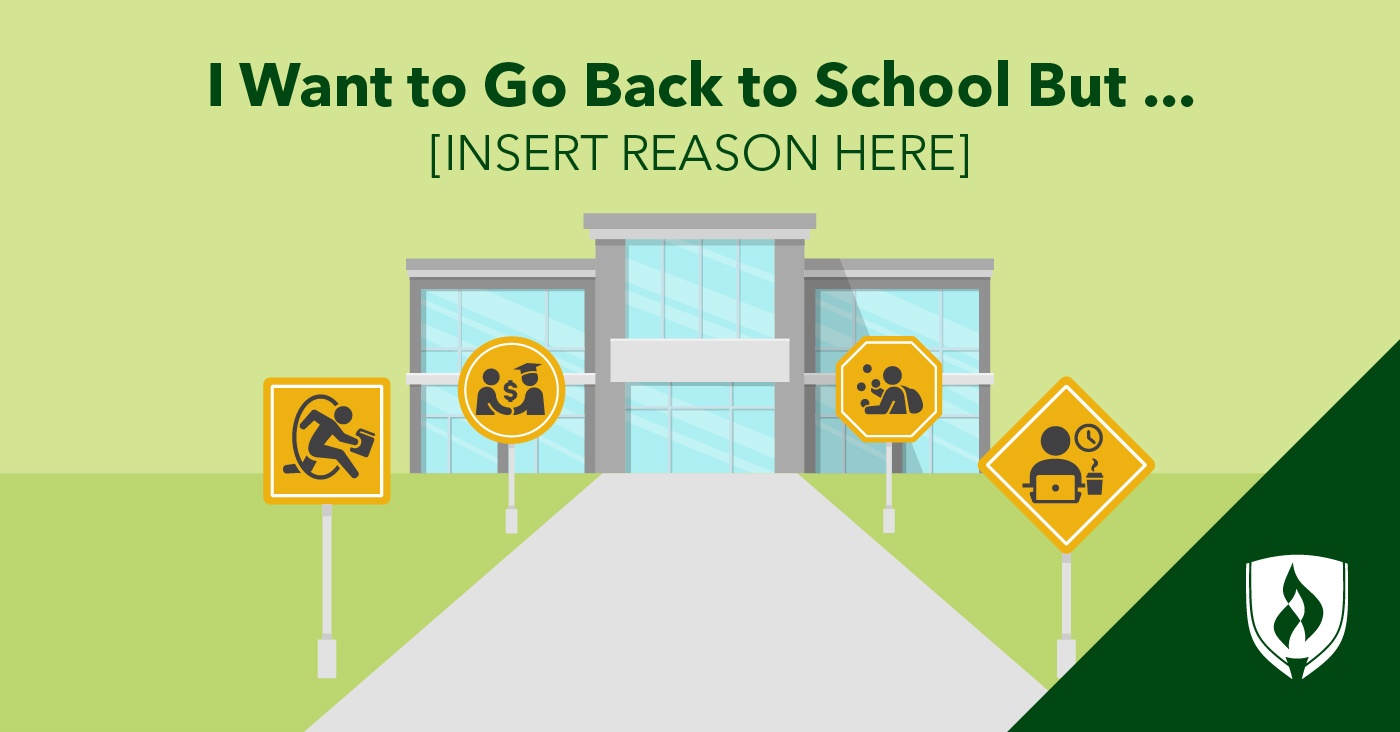
You want to go back to school, but it’s a big step. The time commitment seems like a lot to manage, and maybe you’re almost happy with your current job. Almost. Whether you’re aiming for a promotion or want a totally new career, you have goals, and you think a degree can help you reach them.
If you’re thinking about going back to school, you’re not alone. In 2019, there were over 6.5 million postsecondary students over 25 years old, according to the National Center for Education Statistics.1 They all made the decision to get more education, and you can, too. You’ll have to put in the time for classes and studying, you might have to reduce your hours at work and you’ll definitely have a lot more to juggle, but you can do it.
Yes, your reasons for not going back to school are very real and very valid. But you shouldn’t let them hold you back—these professionals didn’t.
I want to go back to school, but …
I have kids
If you’re a parent, your kids come first, as they should. But that doesn’t mean you need to give up your own dreams—these professionals found ways to care for their kids and earn a degree.
“The two challenges were childcare and finances,” says Dr. Elaine Sanders, founder of Harlem Girls Inc. “Regarding childcare, I had to lean into my support systems because my children at the time were eight, five and three.” Sanders knew this obstacle was one she’d have to face head-on if she wanted to go back to school, so she came up with a plan for thoughtful and direct communication.
“Discuss [the change] with your support systems, so they can understand and assist in this new normal. If you have children, talk with them because they will probably be impacted the most by your absence whether through virtual or in-person learning.” This direct communication helped Sanders ensure she had a plan in place to rely on when things got busier.
“I went to undergrad because my parents told me to. I went to graduate school because I wanted to create a better life for me and my family.”
Even beyond the potential future career a new education can lead to—going to school can benefit your kids by setting a good example for them.
I’m too old
There’s no way around it: Some of your classmates will be younger than you, whether it’s by five years or 20 years. But that doesn’t mean that they all will be, and that doesn’t mean that you can’t find connections with individuals at a different stage of life from you and learn from them.
“At first, I thought I didn’t need to get involved in campus life and activities,” says Sarah Ketchersid of Course Hero®. “I told myself that it was for 18, 19 and 20-year-olds. I thought that because I already had work experience and I was much older that I would leave campus life to the kids right out of high school.”
This initial feeling for Ketchersid did not last long as she began to venture out and network. “My biggest recommendation to any non-traditional student is to get involved in ways that feel right to you. It can be as simple as finding a new group of friends [or] joining a club or a study group,” says Ketchersid. These experiences not only enriched her time on campus but also gave her opportunities to attend industry conferences in her field of study and connect with other professionals. The initial hesitation turned into relationships and opportunities for professional development.
Like any workplace, ages are going to be varied. Taking the chance to connect with people at any stage of life can pay dividends for you down the road. After all, age is just a number.
I work full time
In the age of the internet, the ability to work full time and go to school has made what was once quite difficult a real possibility for many areas of study. Online classes offer more flexibility than traditional classes and might be a good option for you. But even with online classes, there is still one very important skill that you will need to develop: time management.
Nearly all the professionals we spoke to worked full time while earning their degree. Working and going to school means you’ll have to become very good at time management. “If you are able to manage your time, working while in school can actually be a huge asset for you,” Ketchersid says. “By taking the time to map out my plan of how I would eventually pay for my education and not go into debt, I was able to create a college experience that I am proud of and that is giving me an exciting future.”
For those concerned about fitting a weekly class schedule into their plans, online courses in a competency-based education (CBE) format can provide additional flexibility. For example, students in Rasmussen University CBE courses have the option to control the pace of their project-based coursework as long as everything is completed by the end of the term. That means a hectic week or two doesn’t have to throw you off track and hurt your grade—you can work ahead or double up the workload during less busy stretches in your life.
I can’t afford it
It’s true that you’ll likely want to cut back on some expenses in order to budget for school-related costs. You’ll also need to weigh your options and decide which expenses are most important to you. “The biggest challenge holding me back was my finances,” says Joseph Puglisi, CEO of Dating Iconic. Puglisi knew that he may need to put off certain things (like buying a house) in the present for the sake of this longer-term investment. “I knew that if I had to wait too long, I would end up not fulfilling my dreams. So I took one bold step, and that has been one of the best decisions I ever made.”
There are ways to make this aspect a little easier, including loans, grants and scholarships for those who qualify. For Sanders, the decision to take out a loan was tough to swallow at first. “I had to research scholarships and take student loans. Taking out loans was new for me, but I had to tell myself I am worth the investment. Looking back, I would do the same thing all over again because I get to do what I enjoy and get paid to do it.”
Before you rule out returning to school due to your financial situation, be sure to explore scholarships and other financial aid options that may be available to you. Additionally, it may be worth exploring whether your current employer offers tuition assistance or reimbursement for employees who return to school.
I can’t imagine starting over
Starting over in a new career or industry can feel like such a daunting task for all the uncertainty that goes with it. To help with this worry, test the waters: Look for an internship in that field to see if it is right for you.
“Secure an internship in the field you want to pursue before going back to school,” says Ketchersid. “I had internships before, during and after I took my undergraduate classes. This not only gave me real-world experience but helped me map what I was studying to how that would translate into the job I thought I wanted.” The hands-on experience helped her answer so many of the questions or concerns she may have had about this new career because she got a chance to experience it firsthand.
“My internships gave me the opportunity to explore many different options and help me hone what I wanted to do after graduation,” Ketchersid explains. “I now have a job offer to work for that company in the department that is directly related to my degree.”
I haven’t been in a classroom in so long
Maybe it’s been a while since you set foot in a classroom. If so, you might feel a bit thrown by how much things have changed. But those changes can absolutely work in your favor. Technology is tricky when you need to adjust to it, but you might enjoy the increased convenience it provides.
“The teaching methods are different as more technology is being used,” Pugilisi says. “You do not always have to be on campus,” Puglisi says. He points out that many universities offer hybrid and online courses, and because of the pandemic, those options have only increased. Adjusting to new technologies and terms can feel overwhelming, according to Pugilisi, but as you adjust and learn to work smarter, it’s another skill preparing you for your new career.
Of course, there’s more to feeling “classroom ready” than just being able to navigate the technology used. If it’s been a while since writing your last research paper or you haven’t put your understanding of algebra to the test recently, remember to explore the support resources provided—there’s no shame in asking for help getting back up to speed.
What’s holding you back?
Chances are you identified with one—or more—of these potential reasons to not go back to school. Maybe you have children or maybe you’re concerned about your work–life balance; either way, your concerns are valid, but they shouldn’t hold you back from your education. These professionals did it, and so can you.
Are you ready to give schooling a try? Check out Academic Success: 7 Simple Habits of the Best Students to help you thrive as a student.
1“Student Enrollment: How many students ages 25 and over enroll in postsecondary institutions in the fall?” U.S. Department of Education, National Center for Education Statistics, [accessed September 2022], https://nces.ed.gov/ipeds/TrendGenerator/app/answer/2/8.
Course Hero is a registered trademark of Course Hero, Inc.




